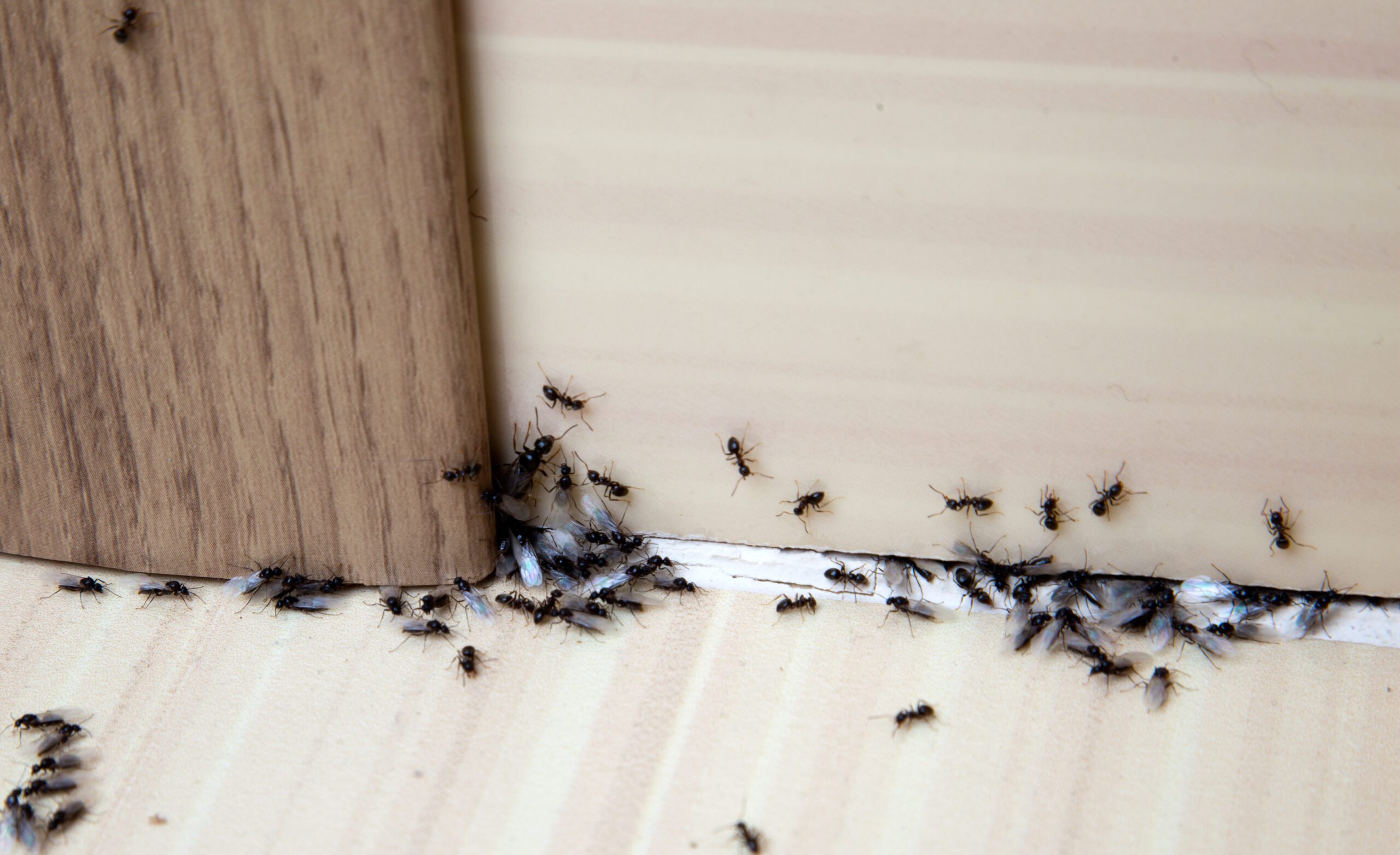Are you tired of sharing your kitchen with uninvited guests? Those tiny black invaders marching across your countertops, scavenging your crumbs, and invading your pantry? Don’t worry—you’re not alone, and there are effective solutions to this common problem.
Welcome to our comprehensive guide on how to get rid of ants in your kitchen. This post is designed to equip you with practical, easy-to-implement strategies for reclaiming your space from these pesky intruders. We’ll explore a variety of methods, from natural home remedies to professional extermination options, ensuring you have all the information you need to make an informed decision.
Stay tuned as we dive deep into this topic, providing you with the knowledge and tools to restore peace and cleanliness to your kitchen. Let’s embark on this ant-free journey together.
Why Are Ants In My Kitchen?
Ants are attracted to your kitchen for two main reasons: food and water. Kitchens provide a perfect environment for these tiny invaders, offering easy access to food particles, sugary spills, and moisture. They are particularly attracted to sweet substances, but will also feed on proteins and fats.
Ants communicate through pheromones. Once an ant finds a food source in your kitchen, it leaves a pheromone trail back to the colony, guiding other ants to the food. This is why you often see ants moving in a line.
To prevent ants from invading your kitchen, you must maintain cleanliness. This involves regular cleaning of countertops, floors, and appliances to remove food particles and sugary spills. Also, ensure that food is stored in sealed containers.
Another effective measure is to seal entry points. Ants are tiny and can enter through the smallest cracks and crevices. Sealing these entry points can help keep ants out.
If the infestation is severe, consider hiring a professional pest control service. They have the necessary tools and expertise to effectively remove ants and prevent future invasions.
Here are a few steps to help you get rid of ants in your kitchen:
1. Identify the type of ants: Different species require different treatment methods.
2. Clean your kitchen thoroughly: Remove all food particles and spills.
3. Seal entry points: Use caulk to seal cracks and crevices.
4. Use ant baits: These contain poison that the ants carry back to their colony.
Remember, the key to keeping ants out of your kitchen is prevention. Regular cleaning and proper food storage can go a long way in keeping these pests at bay.
How To Identify Different Ant Species?
Identifying the specific ant species in your kitchen is a crucial first step in implementing effective ant control measures. Ants are diverse creatures, with over 12,000 known species, but only a few are commonly found in kitchens.
The Odorous House Ants are small, dark brown or black ants that emit a rotten coconut smell when crushed. They are attracted to sweet foods and moisture, often found near sinks or water sources.
Carpenter Ants, on the other hand, are larger, ranging from 1/4 to 1/2 inch in length, and are usually black. They prefer proteins and sweets, making your kitchen a prime target.
Pavement Ants are small, brown to black ants. They are named after their preference for nesting in pavement cracks but can also invade your kitchen in search of food.
Pharaoh Ants are tiny, light yellow to red ants with a preference for sugary foods. They are notorious for their resistance to common ant baits and pose a significant challenge in ant control.
Fire Ants are red to reddish-brown ants known for their painful sting. While they typically nest outdoors, they can invade kitchens in search of food.
Determining the ant species helps in understanding their habits, diet preferences, and nesting locations, enabling you to devise a tailored plan to get rid of ants in your kitchen.
What Attracts Ants Into The Kitchen?
Ants are attracted to the kitchen primarily because of food and water sources. They can detect even the smallest crumbs of food or sugary spills, which they then communicate to their colony. This explains why you often see a trail of ants leading to a food source.
Another attraction for ants is the availability of water. Leaky pipes, condensation, and even pet water bowls can attract ants. They require water for survival and will seek out any available sources.
Ants are also drawn to the kitchen because of the shelter it provides. Kitchens often have hidden corners, cracks, and crevices that make perfect nesting spots for ants.
To deter ants from invading your kitchen, it’s essential to keep it clean. Wipe down surfaces regularly, don’t leave food out, and fix any leaks. Also, seal any cracks or openings where ants could enter.
Remember, prevention is the best form of ant control. By removing what attracts them, you can prevent an infestation before it starts.
- Food: Keep it stored and clean up spills immediately.
- Water: Fix leaks and avoid leaving standing water.
- Shelter: Seal cracks and crevices where ants could nest.
Remember, the key to getting rid of ants in the kitchen is understanding what attracts them in the first place.
Natural Remedies To Get Rid Of Ants?
When ants invade your kitchen, it’s time to take action. One natural remedy to consider is using vinegar. A 50-50 solution of vinegar and water can disrupt the scent trails that ants use to navigate, making it an effective deterrent.
Another household item that can be used to repel ants is cinnamon. Its strong smell can disrupt ant trails and deter them from entering your kitchen. Simply sprinkle ground cinnamon or place cinnamon sticks at the entry points.
Peppermint is another natural ant deterrent. Its strong smell disrupts ants’ sense of smell, preventing them from finding food sources. You can make a peppermint spray by mixing 10 to 20 drops of peppermint essential oil with a cup of water.
Food-grade diatomaceous earth, a type of powder made from fossilized aquatic organisms, can also be used. When ants come into contact with it, it can dehydrate and kill them. Simply sprinkle it around areas where you’ve seen ants.
Remember, the key to effectively using these natural remedies is persistence. Ants are resilient creatures, and it may take some time before you see results. Keep applying these remedies regularly and you’ll soon reclaim your kitchen from these pesky invaders.
How To Use Ant Baits Effectively?
To effectively use ant baits, you first need to identify the type of ants you’re dealing with. Different species are attracted to different types of bait. Some are drawn to sweet substances, others to protein-based ones. Once you’ve identified the ant species, select the appropriate bait.
Place the bait in areas where you have noticed ant activity. Ants usually follow established trails, so placing the bait along these paths will increase the chances of the ants finding it. However, avoid placing the bait directly on the ant trail as this can disrupt the ants’ pheromone path and deter them from the bait.
It’s important to note that ant baits work by attracting ants. So, don’t be alarmed if you notice an increase in ant activity after placing the bait. This is a good sign as it means the ants are taking the bait back to their colony.
Patience is key when using ant baits. It can take several days to a week for the bait to fully eradicate an ant colony. Avoid the urge to kill the ants you see. They are the workers, and killing them will not solve the problem. The queen, hidden in the nest, is the one producing new ants. The worker ants need to carry the bait back to the nest to kill the queen and the rest of the colony.
Remember, ant baits are just one part of an integrated pest management approach. You should also address the underlying issues that attracted the ants in the first place, like accessible food sources and water.
Lastly, always remember to keep ant baits out of reach of children and pets.
Preventive Measures Against Ant Infestation?
When dealing with an ant infestation in your kitchen, the first step is to identify the type of ants. Different species have different preferences, so it’s crucial to tailor your approach accordingly.
Ant baits are a highly effective method for getting rid of ants. Baits consist of food mixed with a slow-acting pesticide, which the ants carry back to their colony, effectively eliminating the entire infestation.
Keeping your kitchen clean is another important preventive measure. Ants are attracted to food and water sources, so ensure you don’t leave any food crumbs or spills lying around. Regularly sweep and mop your floors, clean your countertops, and make sure your food is stored in airtight containers.
Sealing entry points is also an effective way to keep ants out. Ants can enter through tiny cracks and crevices, so use a silicone-based caulk to seal these potential entry points.
Another preventive measure is to use natural ant repellents. Certain substances, like cinnamon, vinegar, and peppermint oil, are known to deter ants.
Lastly, consider professional pest control services if the infestation is severe. These experts have the knowledge and tools to effectively eliminate ant infestations.
Remember, prevention is always better than cure. By implementing these measures, you can keep your kitchen ant-free and maintain a healthy, clean environment.
Are Ants Harmful To My Kitchen?
Ants in the kitchen can indeed cause harm, not only to your food but also to your kitchen’s structure. They can carry bacteria, contaminate your food, and some species can even damage the structure of your home.
Ants are attracted to your kitchen due to the abundance of food and water sources. They are particularly drawn to sweet and sticky substances. Once they find a reliable food source, they leave a pheromone trail, which invites more ants into your kitchen.
Ant infestations can quickly escalate, leading to spoiled food and potential health risks. Some ants, like the Pharaoh ant, can carry harmful bacteria like Salmonella and Staphylococcus, which they can spread to your food.
Moreover, certain ant species like the Carpenter ant can cause structural damage to your home. They burrow into damp or damaged wood to build their nests, which could potentially weaken the structure of your kitchen.
To get rid of ants in your kitchen, follow these steps:
1. Identify the ant species to apply the appropriate treatment.
2. Keep your kitchen clean, especially areas where food is prepared.
3. Seal any cracks or crevices where ants could potentially enter your kitchen.
4. Use ant baits or insecticides, if necessary.
Remember, preventing an ant infestation is always easier than dealing with one. Regular cleaning and proper food storage can significantly reduce the likelihood of an ant invasion in your kitchen.
How To Maintain An Ant-Free Kitchen?
Maintaining an ant-free kitchen is a common challenge faced by homeowners. The key to achieving this is by adopting a proactive approach. First and foremost, cleanliness is paramount. Ants are attracted to food particles, so ensure you clean up immediately after meals. Wipe down surfaces with a vinegar-based solution, which acts as a natural deterrent for ants.
Next, consider the use of ant baits. These are effective tools for ant control as they attract ants which then carry the poison back to their colony, effectively eliminating the problem at its source.
- Keep food in sealed containers: This prevents ants from detecting food sources.
Another method to keep your kitchen ant-free is by sealing off entry points. Ants are tiny creatures and can enter through the smallest of cracks. Inspect your kitchen for any potential entry points and seal them with caulk.
Natural repellents such as cinnamon, peppermint oil, or citrus peels can also be used to deter ants. These can be placed in areas where ants are frequently seen.
Remember, the key to maintaining an ant-free kitchen is persistence and consistency in employing these methods. It may take time, but with diligent effort, you can ensure your kitchen remains free from ants.
Conclusion: Winning the Battle Against Ants in Your Kitchen
In concluding, understanding “how to get rid of ants in the kitchen” is a multifaceted process. The key points discussed in this post include identifying why ants are attracted to your kitchen and how to recognize different ant species. We have also explored various natural remedies and effective use of ant baits to eliminate these pests.
The importance of preventive measures against ant infestation was highlighted, emphasizing the need for maintaining an ant-free kitchen. It’s crucial to remember that while ants may not directly harm your kitchen, they can contaminate food and create an unpleasant environment.
The insights provided here are not only aimed at helping you get rid of ants but also to prevent future infestations. Remember, the key to maintaining an ant-free kitchen lies in cleanliness, proper food storage, and regular inspection for ant trails.
As for future developments, continuous research is being conducted on more eco-friendly and effective ways to control ants. Staying informed about these trends will further enhance your ability to maintain an ant-free kitchen.
Remember, the battle against ants in your kitchen is one that can be won. Use the knowledge gained from this post to reclaim your space from these tiny invaders.




